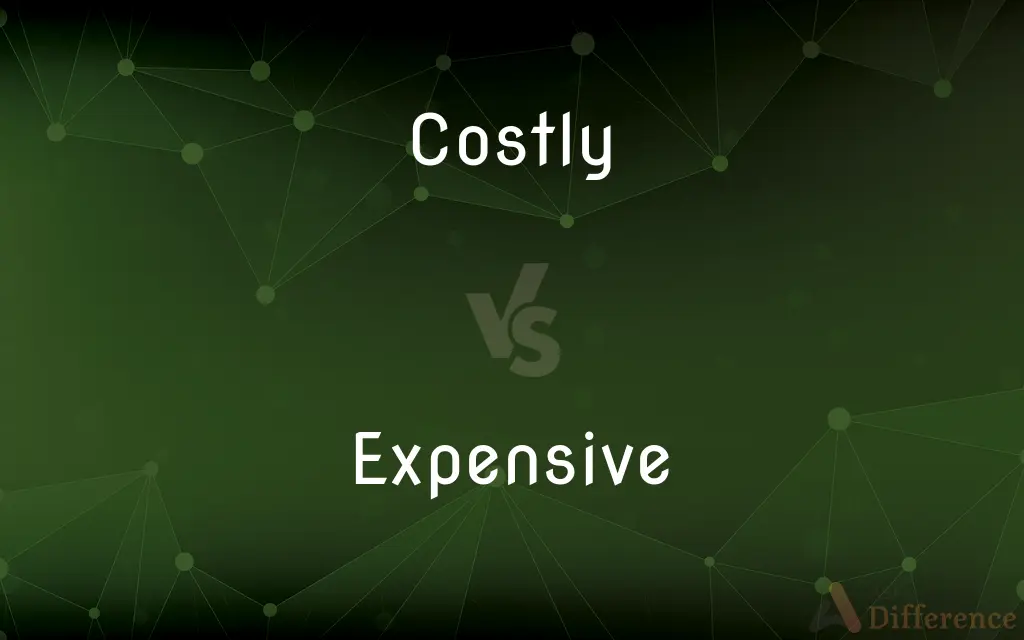Costly vs. Expensive — What's the Difference?
Edited by Tayyaba Rehman — By Fiza Rafique — Updated on September 25, 2023
Both "costly" and "expensive" describe items or services that require a significant amount of money. However, "costly" can also suggest a high value or worth, while "expensive" primarily focuses on the high monetary cost.

Difference Between Costly and Expensive
Table of Contents
ADVERTISEMENT
Key Differences
Both costly and expensive serve as adjectives in the English language to denote something that comes with a high price tag. They are often used interchangeably in many contexts, describing items, experiences, or services that demand a considerable financial outlay. Yet, nuances exist between them.
The term costly, while predominantly referring to monetary expense, can also imply a sense of high value or worth. For instance, a handcrafted artifact might be termed costly, not just for its price but also for its craftsmanship and uniqueness. Conversely, expensive is more straightforward, highlighting the significant monetary aspect of an item or service.
In some instances, costly can be used in non-monetary contexts, hinting at an emotional, physical, or time investment. For example, a decision can be costly if it leads to unfavorable consequences, regardless of money. Expensive, however, is more rooted in the financial realm, rarely used to convey non-monetary expenditures.
The choice between costly and expensive can thus depend on the context. While both can refer to high monetary value, costly offers a broader range, potentially encapsulating value and other non-monetary costs. Expensive, meanwhile, remains more specific to the realm of finance.
Comparison Chart
Primary Meaning
High in price or value.
High in price.
ADVERTISEMENT
Scope
Can refer to monetary and non-monetary costs.
Primarily refers to monetary cost.
Usage
Might imply value or worth.
Focuses on the high monetary aspect.
Context
Can be used in emotional, physical, or time contexts.
Used mainly in financial contexts.
Interchangeability
Often interchangeable with "expensive" but not always.
Mostly interchangeable with "costly" in monetary references.
Compare with Definitions
Costly
Resulting in a significant loss or penalty.
His mistake was a costly one for the team.
Expensive
Characterized by high expenditure.
Living in the city center is expensive.
Costly
Requiring a large expenditure of resources.
The space mission was a costly endeavor for the agency.
Expensive
Valuable in terms of monetary worth.
The artwork is one of the most expensive in the gallery.
Costly
Commanding a high price or value.
The diamond necklace was a costly investment.
Expensive
Having a high cost or price.
The luxury car was too expensive for him.
Costly
Involving considerable time or effort.
The research project was lengthy and costly.
Expensive
Exceeding the usual or expected cost in terms of money.
Dining at that restaurant is always an expensive affair.
Costly
Of great worth or value, especially in terms of quality.
The handcrafted table was a costly piece of art.
Expensive
Requiring a lot of money to purchase or maintain.
Owning multiple properties can become expensive over time.
Costly
Of high price or value; expensive
Costly jewelry.
Expensive
Requiring a large expenditure; costly.
Costly
Entailing loss or sacrifice
A costly war.
Expensive
Marked by high prices
Expensive stores.
Costly
Of high cost; expensive.
A costly activity
A costly error
Expensive
(obsolete) Given to expending a lot of money; profligate, lavish.
Costly
Of great cost; expensive; dear.
He had fitted up his palace in the most costly and sumptuous style, for the accomodation of the princess.
Expensive
Having a high price or cost.
Costly
Gorgeous; sumptuous.
To show how costly summer was at hand.
Expensive
(computing) Taking a lot of system time or resources.
An unnecessarily expensive choice of algorithm
Costly
Entailing great loss or sacrifice;
A dearly-won victory
Expensive
Occasioning expense; calling for liberal outlay; costly; dear; liberal; as, expensive dress; an expensive house or family.
War is expensive, and peace desirable.
Costly
Having a high price;
Costly jewelry
High-priced merchandise
Much too dear for my pocketbook
A pricey restaurant
Expensive
Free in expending; very liberal; especially, in a bad sense: extravagant; lavish.
An active, expensive, indefatigable goodness.
The idle and expensive are dangerous.
Expensive
High in price or charging high prices;
Expensive clothes
An expensive shop
Common Curiosities
Can something be both costly and expensive?
Yes, an item can be both high in price (expensive) and high in value or worth (costly).
Is "expensive" used for non-monetary contexts?
Rarely. "Expensive" primarily denotes high monetary cost.
Which word implies higher quality: "costly" or "expensive"?
"Costly" might imply a sense of worth or high quality, whereas "expensive" focuses on price.
How do I choose between "costly" and "expensive"?
Consider the context. If referring mainly to price, "expensive" fits. For value or non-monetary costs, "costly" might be more apt.
Can a mistake be termed "expensive"?
While "costly" is more apt for non-monetary errors, a mistake with financial repercussions can be termed "expensive."
Is "costly" more formal than "expensive"?
Both are standard English, but "costly" might sound slightly more formal in certain contexts.
Are they interchangeable in every situation?
While often interchangeable in monetary contexts, "costly" offers broader usage for non-monetary costs.
Can "costly" refer to emotional costs?
Yes, "costly" can hint at emotional, physical, or time costs.
Can "expensive" hint at the quality of an item?
Not directly. It primarily denotes high price, but a high price might be associated with high quality.
Do "costly" and "expensive" have the same meaning?
They both refer to high cost but "costly" can also suggest high value or non-monetary costs.
Can a decision be "expensive"?
If it has financial consequences, yes. Otherwise, "costly" would be more fitting.
Is "costly" subjective or objective?
It can be both. It objectively denotes high price or value but can subjectively imply worth or significance.
Can an experience be "costly"?
Yes, especially if it demands a lot in terms of money, time, effort, or emotional toll.
Is "costly" always related to high monetary value?
No, it can also refer to other significant costs like time, effort, or emotion.
How are they used in negative contexts?
"Costly" can hint at loss or detriment, while "expensive" might imply unaffordability.
Share Your Discovery

Previous Comparison
Concrete vs. Ballast
Next Comparison
Correct vs. RightAuthor Spotlight
Written by
Fiza RafiqueFiza Rafique is a skilled content writer at AskDifference.com, where she meticulously refines and enhances written pieces. Drawing from her vast editorial expertise, Fiza ensures clarity, accuracy, and precision in every article. Passionate about language, she continually seeks to elevate the quality of content for readers worldwide.
Edited by
Tayyaba RehmanTayyaba Rehman is a distinguished writer, currently serving as a primary contributor to askdifference.com. As a researcher in semantics and etymology, Tayyaba's passion for the complexity of languages and their distinctions has found a perfect home on the platform. Tayyaba delves into the intricacies of language, distinguishing between commonly confused words and phrases, thereby providing clarity for readers worldwide.














































